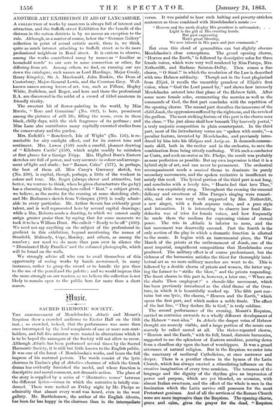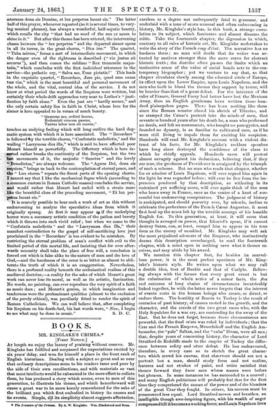i tiu$ it.
SACRED HARMONIC SOCIETY.
THE announcement of Mendelssohn's At/wile and Mozart's Requiem drew a crowded audience to Exeter Hall on the 16th inst. ; so crowded, indeed, that the performance was more than once interrupted by the loud complaints of one or more non-seat- holders, and full five minutes were -wasted in altercations which it is to be hoped the managers of the Society will not allow to recur. Although Athalie has been performed several times by the Sacred Harmonic Society, it is still but little known to the English public. It was one of the latest cf Mendelssohn's works, and bears the fall impress of his matured powers. The words consist of the lyric choruses in Eacine's play of ilthalie--choruses of which the Greek drama has evidently furnished the model, and whose function is descriptive and moral comment, not dramatic action. The place of the story is supplied by a series of "illustrative verses" between the different lyrics—verses in which the narrative is briefly con- densed. • These were 'recited on Friday night by Mr. Phelps so admirably that almost every word was heard, even in the west gallery. Mr. Bartholomew, the author of the English libretto, hat been far less happy in the Choruses than in the intermediate
verses. It was painful to hear such halting and poverty-stricken sentences as these combined with Mendelssohn's music :—
"Heaven an4 the earth display His grandeur is unbounded ;
Light is the gift of His creating hands.
But past expressing
Man's great blessing, We now inherit in His pure and just commands."
liut even this cloud of generalities can but slightly obscure Mendelssohn's clear conceptions. The grand opening chorus, "Heaven and the Earth," is followed by descriptive solos for three
female voices, which were very well rendered by Miss Parepa, Mrs. Netherclift, and Madame Sainton-Dolby. Then comes a fine
chorus, "0 Sinai !" in which the revelation of the Law is described with true Hebrew sublimity. Though not in the least plagiarized
from Elijah, it recalls the unearthly grandeur of Elijah's first vision, when "God the Lord passed by," and shows how intensely
Mendelssohn entered into that phase of the Hebrew faith. After some more female solos, emunerating the mercies RS well as the commands of God, the first part concludes with the repetition of
the opening chorus. The second part describes the innocence of the child Joash, the oppressions suffered by the righteous, and the revels of the godless. The most striking feature of this part is the chorus near the close, "The just alone ahall bow beneath Thy heavenly portal," a truly majestic composition in plain counterpoint. In the third part, most of the introductory verses are "spoken with music,"—a peculiar feature, invented by Mendelssohn, and previgusly intro- duced by him into his CEdipus and Antigone. It demands consum- mate skill, both in the reciter and in the orchestra, to save the combination from being utterly confusing. With such a conductor as Costa, and such an orator as Mr. Phelps, the result was probably as near perfection as possible. But my own impression is that it is a hybrid style of art, and can never be permanent. The orchestral accompaniment needs a musical theme to dominate its purely secondary movements, and the spoken recitative is insufficient to satisfy this need. The lyrical portion of the third part is not long,• and concludes with a lovely trio, "Hearts feel that love Thee," which was exquisitely sung. Throughout the evening the unusual
delicacy and sweetness of Miss Parepa's singing were remark- able, and she was very well suppo. rted by Mrs. Netherclift,
a new singer, with a fresh soprano voice, and a pure style and intonation. It is interesting to observe how fond Men- delssohn was of trios for female voices, and how frequently he made them the medium for expressing visions of eternal peace. The trio in Athalie is inferior to none, and the last movement was deservedly encored. Part the fourth is the only section of the play in which a dramatic function is allotted to the music. It begins with an instrumental piece, the War March of the priests at the enthronement of Joash, one of the most imperial, magnificent compositions that Mendelssohn ever produced. The military effect is of course predominant, but the richness of the harmonies satisfies the thirst for thoroughly intel- lectual art as no mere military marches are wont to do. This is followed by a double chorus of priests and women, the latter urg- ing the former to "strike the blow," and the priests responding. The finest chorus in this part is, however, a later one, "Where are the shafts Thou employest ?" a chorale-like movement, which has been previously introduced as the chief theme of the Over- ture, in which it is beautifully worked up. The fifth part con- tains but one lyric, the chorus, "Heaven and the Earth," which opens the first part, and which makes a noble finale. The effect of the last line, "They declare He is God," is truly sublime.
The second performance of the evening, Mozart's Requiem, carried us centuries onwards to a wholly different development of the Hebrew "root-idea." In ilthalie the deeper veins of Hebrew thought are scarcely visible, and a large portion of the music can scarcely be called sacred at all. The thrice-repeated chorus, "Heaven and the Earth," with its full, broad, diatonic harmonies, suggested to me the splendour of Eastern sunshine, pouring down from a cloudless sky upon the host Of worshippers. It was a grand utterance of natural religion. But in the Requiem we enter into the sanctuary of medimval Catholicism, at once narrower and deeper. There is a peculiar charm in the hymns of the Latin Church, which has always exerted a stimulating influence on the creative imagination of every true musician. The terseness of the language and the dignity of the• rhythm give an impression of power and purpose, which are yet blended, on occasion, with almost Italian sweetness, and the effect of the whole is seen in the fascination which the Latin service still possesses for the most Protestant geniuses. And of all the services of the Roman Church none are more impressive than the Requiem. The opening chorus, grave and calm, gives the prayer for the dead, "Requiem
mternam dona eis Domine, et lux perpetua incest eis." The latter half of this prayer, whenever repeated (as it is several times, to vary- ing musical phrases), has always a wonderful, half-mystic beauty, Which recalls the city "that had no need of the sun cr moon to shine in it." But after this theme has been uttered, the intervening chasm between the "lux perpetua " and the departed sinner opens in all its terror, in the great chorus, "Dies irm." The quartet, "Tuba mirum," forms a sort of intermediate movement, in which the danger even of the righteous is described (" vix justus sit securus ''), and then comes the sublime "Rex tremendm majes- tatis," which concludes with the first individual utterance in the service—the pathetic cry, " Salva me, Pons pietatis !" This leads in the exquisite quartet, " Recordare, Jean pie, quod sum causa tum vim," which is the most beautiful and personal movement of the whole, and the vital, central idea of the service. I do not know at what period the words of the Requiem were written, but certainly their whole drift approaches very near to Luther's "justi- fication by faith alone." Even the just are "hardly secure," and the only certain safety lies in faith in Christ, whose love for the sinner is here appealed to in verses of much beauty.
" Qua3rens me, sedisti lasses,
Redemisti erucem passes, Tantus labor non sit closes,"
touches an undying feeling which will long outlive the hard dog- matic system with which it is here associated. The " Recordare " is followed 43y the terrible chorus, "Confutatis maledictis," and the wailing " Lacrymosa dies illa," which is said to have affected poor Mozart himself so powerfully. The Offertory which is here in- serted rather breaks the continuity of the Requiem, but the two last movements of it, the majestic " Sanctus " and the lovely "Benedictus," are always welcome. The "Agnus Dei, dona eis requiem," brings us back to the contemplation of eternal peace, and the "Lux eterna " repeats the finest parts of the opening chorus. I cannot say that I like the mechanical fugue which (according to a common custom in Roman Catholic masses) concludes the service, and would rather that Mozart had ended with a strain more like the beautiful close of the preceding movement, "Et lux per- petua luceat eis."
It is scarcely possible to hear such a work of art as this without endeavouring to analyze the speculative ideas from which it originally sprang. At first it may appear at if the underlying horror were a necessary artistic condition of the pathos and beauty which it throws into such vivid relief ; but when we come to the " Confutatis maledictis and the "Lacurnosa dies illa," their manifest contradiction to the gospel of self-sacrificing love just proclaimed in the " Recordare" is too evident to be mistaken. By restricting the eternal problem of man's conflict with evil to the limited period of this mortal life, and insisting that for ever after- wards necessity shall take the place of free will, a conclusion is forced out which is false alike to the nature of man and the love of God,—and the harshness of the error is so bitter as almost to obli- terate the truth of which it is an exaggeration. Nevertheless, there is a profound reality beneath the ecclesiastical realism of this medimval doctrine,—a reality for the sake of which Mozart's great work can never lose its moral, as well as its artistic, fascination. No words, no painting, can ever reproduce the very spirit of a faith as music does ; and Mozart's genius, in which imagination and tenderness were the predominant qualities (almost to the exclusion of the purely ethical), was peculiarly fitted to render the spirit of Roman Catholicism. We can well believe that, after completing his Requiem on his death-bed, his last words were, "Now, I begin
to see what may be done in music." S. D. C.































 Previous page
Previous page